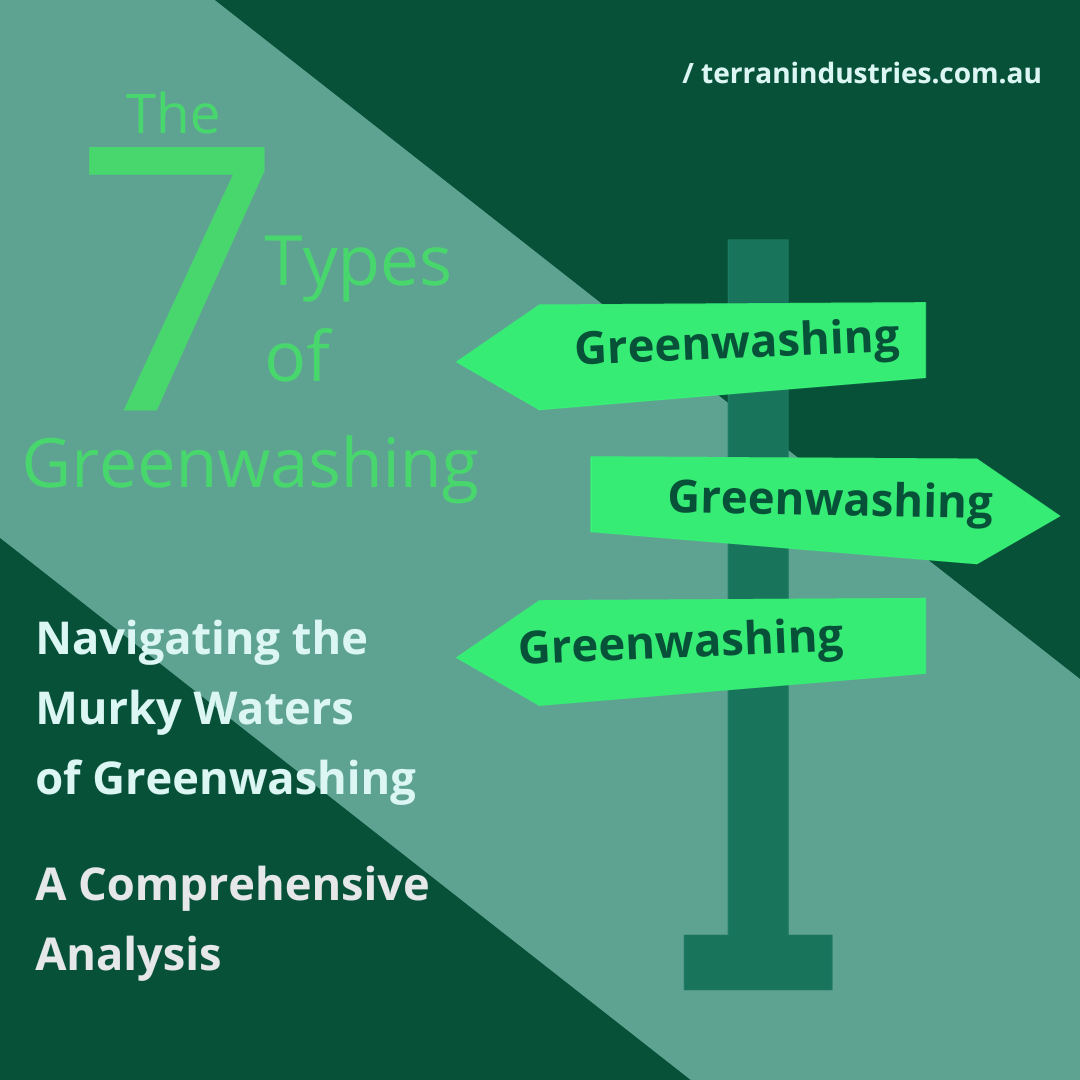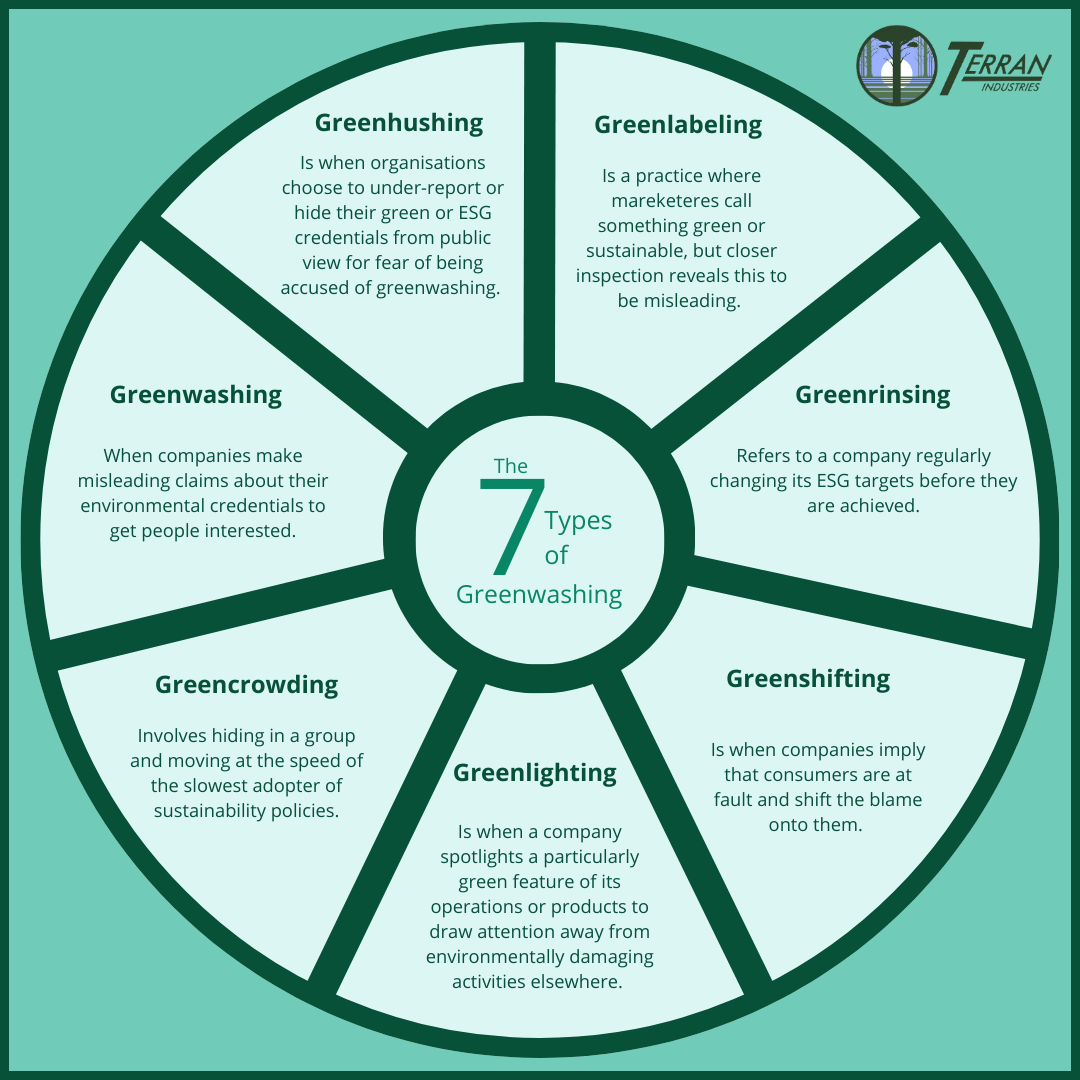BusinessSustainabilityConsumerESGNavigating the Murky Waters of Greenwashing

In today's environmentally conscious world, consumers are increasingly demanding sustainable products and services. This shift has led many businesses to embrace eco-friendly practices, but it has also given rise to a phenomenon known as greenwashing.
Greenwashing occurs when companies make misleading claims about their environmental credentials to attract consumers.
However, greenwashing is not a one-size-fits-all issue. In fact, there are seven distinct types of greenwashing, each with its own characteristics and consequences.
In this article, we will delve into these seven types, explore how they interact with each other, and discuss what this means for businesses. Additionally, we will provide guidance on how businesses can avoid falling into the greenwashing trap and what they should do to uphold genuine environmental sustainability.
1. Greenwashing
Greenwashing is the most recognised form of deceptive marketing. It involves companies making exaggerated or false claims about their commitment to sustainability, often by emphasising a small eco-friendly aspect while ignoring larger environmentally damaging practices. This tactic aims to attract eco-conscious consumers, but it ultimately erodes trust when exposed.
2. Greenrinsing
Greenrinsing occurs when a company continuously changes its Environmental, Social, and Governance (ESG) targets before achieving them. This deceptive practice allows companies to present a facade of progress while avoiding actual sustainable commitments. The constant shifting of goals leaves stakeholders disillusioned and questioning the company's dedication to sustainability.
3. Greenlighting
Greenlighting involves highlighting a single eco-friendly aspect of a company's operations or products to divert attention from more harmful practices. For instance, a clothing brand may tout its sustainable fabric while ignoring exploitative labour practices. By strategically promoting one positive aspect, companies aim to overshadow their negative environmental impact.
4. Greenhushing
Greenhushing is a practice where organisations deliberately under-report or hide their green or ESG credentials from public view. Companies may fear being accused of greenwashing, leading them to downplay their sustainability efforts. This lack of transparency raises suspicions and undermines credibility.
5. Greenshifting
Greenshifting is a tactic where companies shift the blame for environmental issues onto consumers. They imply that consumers are at fault for not making more sustainable choices, deflecting attention away from their own unsustainable practices. This type of greenwashing can lead to a sense of guilt among consumers, discouraging rather than encouraging sustainable behavior.
6. Greenlabeling
Greenlabeling is a deceptive practice where marketers label products or services as green or sustainable, even when closer examination reveals these claims to be misleading. These labels may be vague or unsubstantiated, misleading consumers into making choices they believe are eco-friendly but are not.
7. Greencrowding
Greencrowding involves companies hiding within a group and moving at the pace of the slowest adopter of sustainability policies. Instead of taking the lead in environmental initiatives, they wait for industry standards to catch up. This form of greenwashing allows companies to appear less irresponsible by comparison but hinders overall progress toward sustainability.

Interactions and Consequences
These seven types of greenwashing are not mutually exclusive; they often overlap and reinforce one another. For example, a company practicing greenlighting might also engage in greenshifting to deflect blame for its environmental impact. Furthermore, the consequences of greenwashing can be severe for businesses. These include:
Damage to Reputation Greenwashing erodes consumer trust, tarnishing a company's reputation and brand image.
Legal Consequences Regulatory bodies can impose fines and sanctions on companies found guilty of deceptive environmental marketing.
Financial Risks Investors increasingly consider ESG factors when making investment decisions. Companies engaged in greenwashing may face financial risks as their practices come to light.
Lost Market Share As consumers become more eco-conscious, they are likely to switch to brands with genuine sustainability commitments, causing businesses practicing greenwashing to lose market share.
Avoiding Greenwashing and Ensuring Ethical Sustainability
To avoid greenwashing, companies should take the following steps:
1. Transparency: Be transparent about environmental efforts and progress, even when challenges exist.
2. Genuine Commitment: Make authentic, long-term commitments to sustainability, setting achievable ESG goals.
3. Independent Verification: Seek third-party certifications or audits to validate sustainability claims.
4. Consistency: Maintain consistency in messaging and actions across all aspects of the business.
5. Educate Consumers: Educate consumers about sustainable choices and practices without blaming them for environmental issues.
6. Lead by Example: Be a sustainability leader in your industry rather than waiting for others to set the pace.
Conclusion
Greenwashing, in its various forms, poses significant challenges for businesses seeking to capitalise on consumer demand for sustainability. Recognising and addressing these deceptive practices is vital for maintaining consumer trust, protecting reputation, and fostering genuine environmental stewardship.
By adopting transparency, authenticity, and ethical commitment to sustainability, businesses can not only avoid greenwashing but also contribute to a more sustainable future for all.

Evannah Jayne
Founder & CEO
A passion for sustainability and a desire to change the world, Evannah seeks to raise awareness of the important issues surrounding our planet today.
